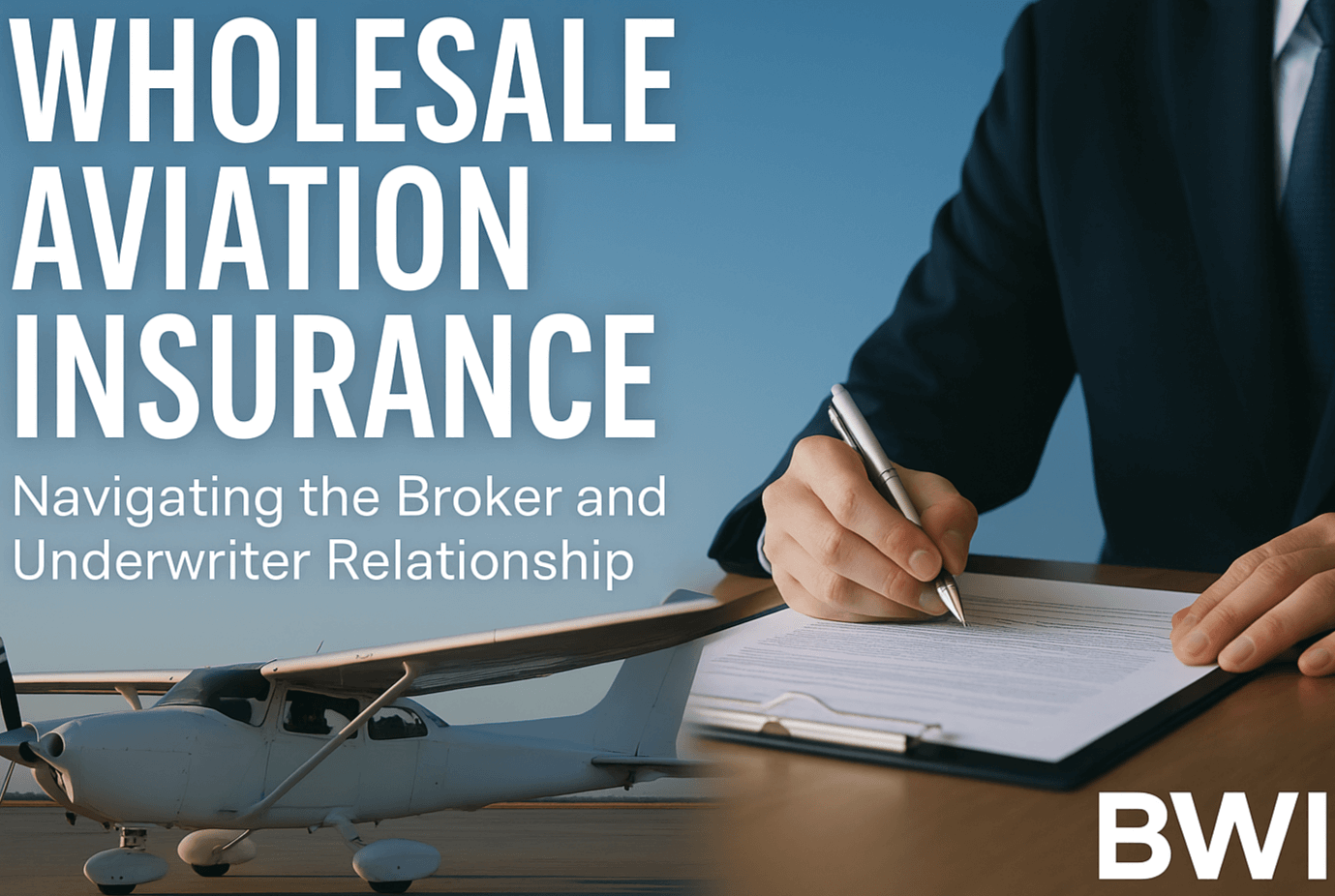When it comes to the aviation insurance industry, there are two main distribution channels for policies: direct-to-customer retail brokers and wholesale brokers. Wholesale aviation insurance plays a critical but often misunderstood role in how aircraft owners, operators, and aviation businesses get coverage.
In this guide, we’ll explain what wholesale aviation insurance is, how it differs from retail aviation insurance, when wholesale brokers are used, and the pros and cons of working with them. Whether you’re a pilot, an FBO owner, or an aviation business leader, understanding wholesale aviation insurance will help you navigate the market more effectively.
What is Wholesale Aviation Insurance?
Wholesale aviation insurance is a business-to-business (B2B) model where a wholesale broker works with retail insurance agents to provide specialized coverage for their clients. In other words, the wholesale broker doesn’t deal directly with the aircraft owner or business — they support retail agents by accessing insurance carriers, underwriting programs, and expertise that those agents may not have.
Think of it like a behind-the-scenes partner. If your local insurance agent doesn’t have a direct contract with a specific aviation insurance carrier, they may use a wholesale broker who does.
Wholesale vs. Retail Aviation Insurance
When is Wholesale Aviation Insurance Used?
Wholesale brokers are most often used when:
- A retail broker doesn’t have a direct appointment with a needed aviation insurance carrier.
- The risk is specialized — e.g., agricultural spraying, aerial firefighting, international operations, experimental aircraft, or high-hull-value turbine/jet aircraft.
- The retail broker needs guidance on aviation-specific underwriting.
- The retail broker wants to shop multiple carriers quickly through a single aviation specialist.
Advantages of Wholesale Aviation Insurance
- Specialized Expertise: Wholesale brokers are often former pilots, mechanics, or industry veterans who understand complex aviation risks.
- Broader Market Access: Retail brokers gain access to carriers they otherwise couldn’t reach.
- Time Efficiency: Wholesale brokers can quickly get multiple quotes.
- Risk Placement Solutions: Can place hard-to-insure risks that direct retail brokers may struggle with.
Potential Downsides
- Added Layer: The policyholder works through both a retail broker and wholesale broker, which can slightly slow communication.
- Commission Sharing: Retail and wholesale brokers split the commission, but this usually doesn’t affect the end price to the customer.
- Less Direct Control: The wholesale broker manages the carrier relationship.
Wholesale Aviation Insurance in Today’s Market
In 2025, the aviation insurance market remains relationship-driven. Many carriers only work with a select number of wholesale or retail brokers. If your retail broker is not part of those networks, wholesale brokers become essential to getting the best policy for your needs.
With market hardening in certain segments (like rotorcraft, warbird, and high-value turbine jets), wholesale brokers often provide the only viable route to multiple competitive quotes.
Example Scenario
Let’s say you’re a helicopter operator in Alaska with a mixed-use fleet for charter, utility work, and medevac. Your local retail broker specializes in general insurance but has no direct appointment with an aviation carrier willing to cover your risk. That broker calls a wholesale aviation broker who has access to carriers specializing in rotorcraft operations. The wholesale broker gathers quotes, negotiates coverage terms, and sends them back to your retail broker — who presents the options to you.
Wholesale Aviation Brokers vs. Managing General Agents (MGAs)
While wholesale brokers and MGAs can both serve as intermediaries, an MGA typically has binding authority from the carrier, meaning they can issue policies and endorsements without the carrier’s direct involvement. Wholesale brokers generally do not have binding authority but act as a specialized conduit between retail brokers and carriers.
Choosing the Right Path
For aircraft owners, the takeaway is simple:
- If your retail broker can access the best carrier directly, great.
- If they need to use a wholesale broker, that’s not a bad thing.
- The quality of your coverage comes down to the broker’s expertise, carrier access, and negotiation skill, not just their title.
At BWI Aviation Insurance, we work directly with most major aviation carriers, eliminating the need for a wholesale broker in many cases. This keeps communication direct and speeds up the quoting process. But when needed, we also collaborate with wholesale partners to ensure our clients always have the best possible options.
Final Thoughts
Wholesale aviation insurance is an important part of the industry’s infrastructure. Without it, many aircraft owners wouldn’t have access to specialized carriers, and many retail brokers wouldn’t be able to serve niche aviation markets.
Whether you go through a retail broker, a wholesale broker, or a mix of both, the key is choosing partners who understand aviation risks inside and out. That’s where BWI Aviation Insurance excels, combining deep industry expertise, direct carrier relationships, and the ability to leverage wholesale partners when needed.
Need help finding the best aviation insurance, retail or wholesale? Contact BWI Aviation Insurance today at 800-666-4359 or request a quote online.
Continue Reading



